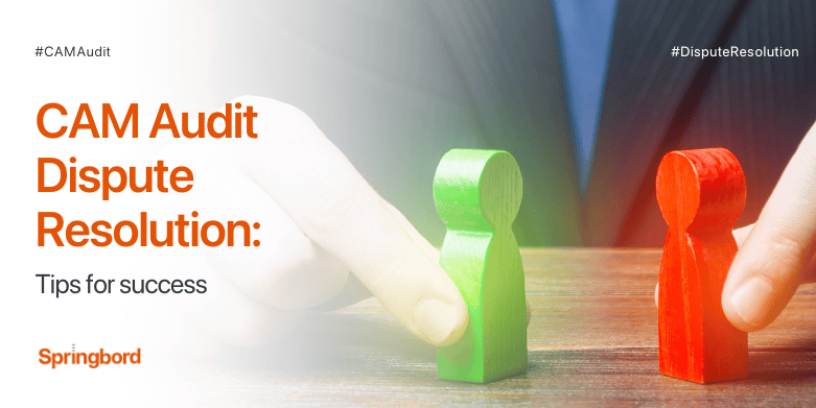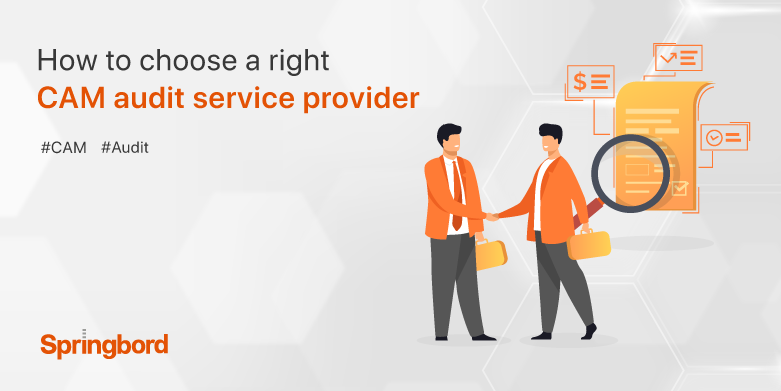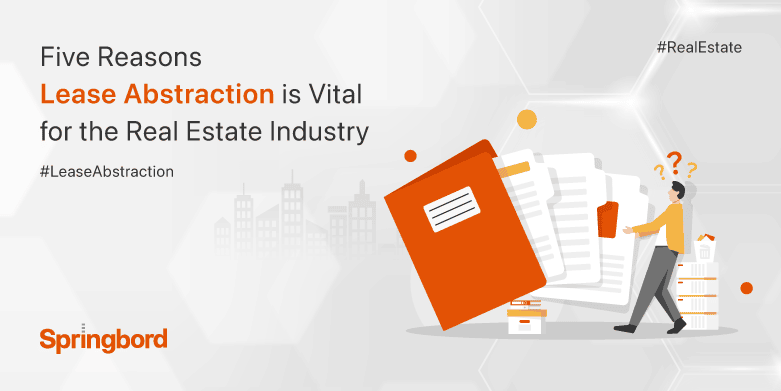 Read time 9 min
Read time 9 minCAM audit dispute resolution is critical to ensuring fair and transparent financial practices. It’s vital to efficiently traverse the settlement procedure when issues come up during a CAM audit. Addressing conflicts and disagreements resulting from interpreting contract clauses, financial evaluations, and audit findings is a part of CAM audit dispute resolution.
It takes careful planning, efficient communication, and a clear understanding of the CAM audit procedure to resolve these conflicts successfully. This article will provide valuable tips and strategies for achieving success in CAM audit dispute resolution.
Understanding the CAM Audit Process
A CAM (Common Area Maintenance) audit thoroughly evaluates the costs associated with standard area maintenance, repair, and operation when it comes to commercial assets like shopping malls, office buildings, and industrial parks.
The goal of a CAM audit is to verify that tenants are being charged the correct amounts for their proportionate share of standard area maintenance costs per their lease agreements.
Key elements and requirements of a CAM audit:
- Lease Agreement Review: The first step in conducting a CAM audit is a comprehensive assessment of the landlord and tenant lease agreements. The lease agreement often spelled out the mechanism of determining and charging tenants for their proportionate share of common area expenses.
- Expense Documentation: Invoices, receipts, contracts, and financial statements are just some documents the auditor reviews during a CAM audit. The receipts and other paperwork can be used as proof of expenditures and to evaluate whether or not they were warranted.
- Calculation of Common Area Expenses: Third, the auditor will determine the total amount spent on common areas and divide it among the tenants using the allocation formula or technique specified in the leases. The allocation might be based on square footage, occupancy rate, or a hybrid.
- Comparison to Lease Agreement Terms: Fourth, the auditor checks to see if the calculated expenses allotted to each tenant match the requirements indicated in the lease agreements. This process verifies that the costs have been computed and allocated correctly.
Common issues or disagreements that may arise during the audit process:
- Inconsistent Expense Categorization: First, improper or unclear spending categorization is a prevalent problem in CAM audits. Expenses incurred by the common areas may be contested if different parties interpret and classify them differently.
- Maintenance vs. Capital Expenses: Second, agreeing on maintenance costs and what’s considered an investment can be challenging. Generally, landlords are responsible for capital expenses, and tenants are responsible for maintenance expenses included in CAM.
A thorough examination of the lease agreements and accounting rules may be necessary to determine whether an expense is considered maintenance or capital.
- Audit Rights and Access to Information: Disputes may occur over the auditor’s right to inspect all relevant financial records and supporting documents. Tenants have the right to inspect and audit landlord financial records, although landlords can restrict this access if they deem it necessary to safeguard private information.
Finding a middle ground between renters’ audit rights and landlords’ genuine concerns is essential for resolving these difficulties.
- Calculating Expense Allocations: Fourth, the method used to compute expense allocations can be a point of contention. Tenants may dispute the technique or results, claiming that they do not fairly reflect their contribution to the costs.
Resolving such disputes requires an in-depth review of the relevant lease clauses and financial documents.
To work through these problems and differences, there needs to be clear communication, a solid grasp of the leasing agreements, and a commitment to the applicable legal and accounting standards. All parties must communicate effectively and work together to find solutions that are fair, equitable, and in line with the lease agreements and industry norms.
Tips for Preparing for CAM Audit Dispute Resolution
An audit of a business property’s Common Area Maintenance (CAM) accounts can reveal whether or not tenants are contributing their fair part to the costs of keeping common areas in good working order.
Tenants, however, must be ready to negotiate effectively and resolve disagreements arising during the audit process. Here are some tips to help you prepare for CAM audit dispute resolution:
- Thoroughly review the CAM audit findings and documentation: Before proceeding with dispute resolution, it is essential to thoroughly evaluate the CAM audit findings and supporting documents.
Learn to interpret the auditor’s findings, calculations, and detected discrepancies. If you disagree with the results or suspect there are mistakes, jot them down. This analysis will serve as a cornerstone as you build your approach to conflict resolution.
- Identify and gather supporting evidence to strengthen your position: Find the evidence you need to back up your argument and collect it. Compiling all pertinent supporting data to bolster your case during dispute resolution is essential.
Any paperwork that pertains to the costs at issue, such as a leasing agreement, invoices, receipts, maintenance logs, or communication.
The documents you’ll be using to back up your claims and arguments should be arranged to make them quick and simple to find. Your argument will strengthen with the introduction of new proof.
- Consult with legal and financial experts for guidance: Disputes arising from CAM audits can be intricate and complicated, necessitating knowledge of the law and finance. Real estate attorneys and financial advisors with experience in commercial leasing and conflict resolution are good resources to tap into.
Tenants can benefit significantly from the guidance of these professionals, who can explain the meaning of complex lease and CAM clauses and assist with resolving any disputes that may arise. Your chances of a successful outcome will be significantly improved with their assistance.
- Establish a clear and concise argument: A well-developed, brief argument is the most effective way to present your case during the CAM audit dispute settlement process. Explain your stance thoroughly by responding to each opposing view and offering facts to support your arguments.
Check that your reasoning makes sense, that your argument is well-organized, and that it is supported by evidence. Preparing responses to the other side’s potential arguments is also crucial for winning a debate.
Strategies for Effective CAM Audit Dispute Resolution
Effective techniques that promote open communication, investigate alternate conflict resolution approaches, engage in negotiations, and seek expert help are essential when addressing issues originating from Common Area Maintenance (CAM) audits.
These strategies help all parties involved reach a fair and mutually agreeable resolution.
Maintain open and effective communication with all parties involved:
Maintaining open and effective communication is vital throughout the CAM audit dispute resolution process. Misunderstandings may be avoided, trust can be established, and the information exchanged more easily when communication is clear and straightforward.
The communication process should involve all relevant parties, including the landlord, the renter, the CAM auditor, and legal representatives.
Concerns, points of view, and solutions can be discussed and worked out at regularly planned in-person or online meetings. A cooperative atmosphere for conflict resolution can be fostered by encouraging all sides to speak up and be heard.
Consider alternative dispute resolution methods, such as mediation or arbitration:
In some cases, traditional litigation may not be the most efficient or cost-effective method for resolving CAM audit disputes. Mediation and arbitration are two forms of alternative dispute resolution (ADR) that can facilitate better communication and compromise.
A mediator is an impartial third person who helps parties in a dispute discuss things to reach a mutually agreeable resolution on their terms. In contrast, in arbitration, a third-party neutral judge reviews the evidence offered by both sides and issues a final, legally enforceable ruling.
Alternative dispute resolution methods like mediation and arbitration offer greater leeway, privacy, and speed than going to court.
Engage in negotiations to find a mutually agreeable resolution:
Conflicts arising from CAM audits can be resolved through negotiation. The goal of any successful negotiation is to obtain an acceptable agreement for all parties involved. Entering talks with a positive frame of mind and a willingness to make concessions is crucial.
Finding solutions that work for everyone requires first understanding their interests and concerns. Instead of taking opposing positions in negotiations, the parties should work towards a mutually beneficial resolution. It may be helpful to bring in professional negotiators or mediators to improve the chances of a successful negotiation.
Having all the necessary paperwork and evidence to back up your stance is crucial before entering into talks. Lease agreements, CAM audit reports, upkeep logs, and other pertinent financial documentation may be included here.
You will be better prepared to present your case and address any differences or inaccuracies that may have contributed to the dispute if you carefully read and comprehend these materials.
Seek professional guidance and representation, if necessary:
In complex CAM audit disputes, seeking professional guidance and representation from lawyers experienced in real estate or commercial litigation is advisable.
These experts can assist shed light on the issue from a legal perspective, clarify your rights and responsibilities under the lease, and guide you through the maze of the legal system. They can help you weigh the merits of your case, plan a course of action, and advocate on your behalf during settlement talks or alternative dispute resolution.
Legal representation is crucial if the conflict escalates to the point where legal action is required. A good lawyer will help you prepare for court, present your case effectively, and defend your rights and interests.
Overcoming Challenges in CAM Audit Dispute Resolution
Commercial real estate leases generally contain a CAM charge to cover the costs of maintaining the property’s common areas. Landlords and tenants can participate in CAM audits to check that the prices are calculated correctly and fairly. Contrarily, audits can spark arguments between stakeholders, posing challenges that must be surmounted.
Resolving Disagreements Over Contract Terms and Agreements:
One of the critical challenges in CAM audit dispute settlement is conflicting interpretations of contract terms and agreements.
Lease agreements frequently need to be clarified more because of ambiguous language or divergent understandings of essential clauses. Disagreements may arise if the parties’ definitions of CAM expenses, deductions, and duties differ.
The only way to get around this roadblock is to thoroughly read the lease and all supporting documents. Direct and frank communication is the only way for both parties to get to a common understanding. Contractual issues can be challenging to navigate without the assistance of legal experts in lease negotiations and commercial real estate.
If the parties cannot resolve their disagreement through dialogue, they may pursue mediation or arbitration as alternative dispute resolution methods. In these processes, a neutral third party facilitates conversation and guides the two sides toward a compromise they can both accept.
Working with detailed financial evaluations and calculations:
Medical cost auditing could involve substantial numerical analysis to verify the accuracy of bills. This complexity raises questions of whether or not the approach is correct, whether or not specific fees should be included, and whether or not the costs should be fairly distributed among tenants.
Differences in accounting can exacerbate disputes of this nature practices, differing interpretations of applicable accounting standards, and a need for supporting data.
A well-thought-out audit strategy is needed to overcome this challenge. To keep things consistent and transparent, this framework should lay out the norms and regulations to be adhered to. The parties to a disagreement need access to all invoices, receipts, and other financial documentation at issue.
Experts in commercial real estate auditing who work independently of banks and other financial institutions can be invaluable. These professionals can look at numbers without bias, do the math well, and offer guidance on accounting norms and procedures. Their neutral perspectives can help parties reach a compromise on controversial financial interpretations.
Controlling your feelings and those of others through mediation:
When money is at stake, emotions can run high during dispute resolution. Conflict and tension may arise between tenants and landlords due to CAM audits. Compromise becomes less likely when emotions, biases, and competing interests cloud rational discussion.
It is crucial to encourage a cooperative and respectful attitude to deal with the emotional and interpersonal dynamics involved in conflict resolution. Maintaining communication channels and encouraging both parties to voice their concerns and listen to the other’s viewpoint is crucial.
A mediator or facilitator can lessen the impact of the emotional factors at play in a negotiation. They are responsible for keeping the group on target, helping them discover common ground, and encouraging them to think of creative solutions.
The role of a mediator is to enable parties to work together to find solutions to a disagreement by lowering tensions, balancing the power, and reframing the issue.
To Sum Up
Effective resolution of CAM audit disputes necessitates careful preparation, proficient communication, and strategic negotiation. It is crucial to gather substantial evidence, seek guidance from experts, and explore alternative approaches to dispute resolution.
However, maneuvering through these intricacies can be challenging. This is where Springbord comes into the picture. With a commendable track record spanning over two decades, Springbord is a trusted provider of high-quality labeling services.
Springbord specializes in tailored data labeling services, offering labels for diverse datasets and invaluable insights into customer behavior. When it comes to CAM audit dispute resolution, you can rely on Springbord’s expertise and assistance to steer you towards a favorable outcome.







